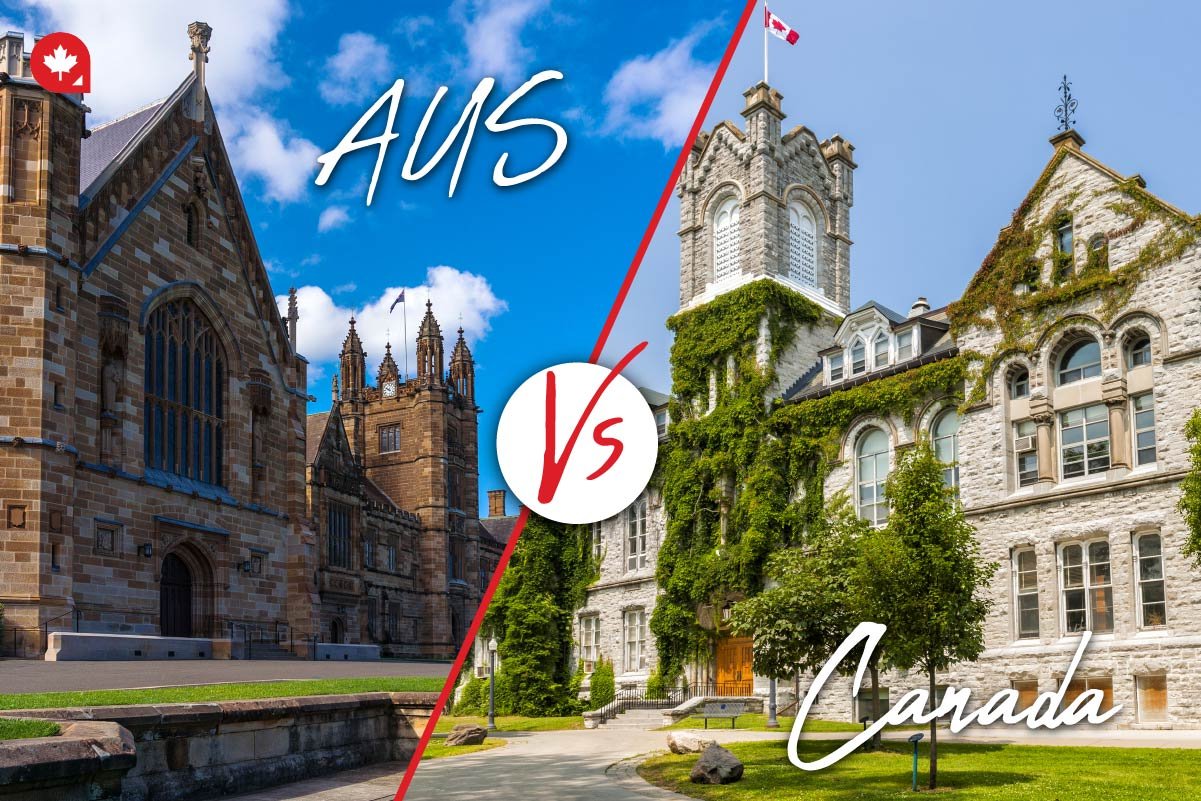Canada and Australia are two countries that top the list of popular destinations for students looking to pursue an education abroad. Both are first-world nations with a wealth of offerings that can give you the best foundation to build your future career. But this makes it quite challenging to choose between the two. So if flipping the coin to decide whether you should study in Canada or the land of Oz is not enough, let's take a closer look to help you make up your mind!
The University Education System in Canada and Australia

Canada and Australia both have world-class education systems. Learn more about each below.
Canadian Universities
The Canadian education system has a reputation of prestige. With 96 public universities offering 15,000 study programs, these institutions range from smaller campuses with more intimate study environments to more significant research-centered powerhouses. So if you're looking for a thriving research culture, you'll be happy to find that many Universities in Canada exceed the G7 (an inter-governmental political forum consisting of Canada, France, Germany, Italy, Japan, the United Kingdom, and the United States) average in clinical medicine, information and communication technology, agriculture, economics and business, to name a few.
Australian Universities
Australia is also known for setting the bar relatively high when it comes to excellence in education on an international level. With 43 universities - 40 Australian universities, two international universities, and one private specialty university, the Ozzie education system comprises a network of world-class education providers, high-quality facilities, and great student support structures. In addition, there is a solid system of quality control and government accreditation to ensure you'll receive the best university experience possible - specifically for international students.
World Rankings For Top Canadian and Australian Universities
Both Canada and Australia are known for having top universities for studying abroad. Here is a list of top universities in Canada and Australia according to the QS World University Rankings 2023.

University Costs Compared
As a student, affordability matters, so finding a reputable course that you can afford is usually a challenge. Because so many of Canada's top universities are based in smaller cities with lower living costs, surviving on a student budget should be easier. If you find that the university of your choice is in one of the bigger cities, the good news is that these are often more affordable than other major cities worldwide.
If you’d like to become an international student in Canada, you should note that costs vary from province to province for university fees and day-to-day expenses, so weighing up a few options before settling on your final choice is always a good idea. According to EduCanada, international students who want to study in Canada can expect to pay around 36,100 CAD for undergraduate programs and around 21,100 CAD for graduate programs. On average annual living expenses for students add up to about 12,000 CAD. Learn more about how much it costs to study in Canada.
While Australia is one of the world's foremost study-abroad destinations, it is also one of the least affordable for international students. Fees at Australian universities tend to vary from area to area and according to degree level. For example, if you decide on a Doctor of Philosophy at one of the country's universities, you could pay around AU$ 51,000 (44,415,77 CAD). You're also likely to need around AU$ 21,041 annually for your living expenses, as set out in the country's student visa requirements.
Scholarship Opportunities

There are many scholarship opportunities to support the best and brightest students wanting to further their education in Canada. Make sure that you explore the various Canadian scholarship databases to find one relevant to your country of origin and field of study. You'll find scholarships, fellowships, and research opportunities from Global Affairs Canada and various federal government entities.
You'll also find many scholarships, grants, and bursaries that help you financially in Australia. The Australian government, education institutions, and various organizations provide these. All applications and inquiries for scholarships are made through the scholarship provider.
Find out how you can get a scholarship to study in Canada.
Health Insurance
One of the top benefits of living in Canada is its universal healthcare. This is only available to Canadian citizens and permanent residents, though. So if you're going to study in Canada, you'll have to take out health insurance for the period you'll be in the country. You will, however, find some Canadian provinces offer this to international students via their provincial plan. Remember, medical services can be costly, especially if you end up in the emergency room and must pay upfront.
All provinces and territories will provide free emergency health services to those without a health card, but these services are restricted. If you are not eligible for provincial health coverage and your university doesn't have a health insurance plan, you should apply for at least a basic health insurance plan that takes care of medication, hospital stays, and some of your dental needs.
The Australian Department of Home Affairs requires international students to maintain specific health coverage for the duration they are in Australia, so they have a special health insurance coverage for international students known as Overseas Student Health Cover (OSCH). International students and their dependents must obtain OSHC when starting their studies Down Under. It includes cover for visits to the doctor, some hospital treatment, ambulance cover, and limited pharmaceuticals (medicines). OSHC insurers offer a range of products, from basic cover to more comprehensive benefits.
Study Permit and Study Visas

To become an international student in Canada, you'll have to apply for a Canadian student permit. Before you apply for this, you will require:
- A letter of acceptance from a Designated Learning Institution (DLI)
- A valid passport
In Canada, a DLI is a school, college or university which is granted permission by the provincial or territorial government to accept international students. So if you're heading to a college or university up North, ensure it meets these criteria. If you're going to study in Quebec, note that current provincial rules state that foreign students have to attend a designated learning institution chosen by the Government of Quebec.
As a foreign student in possession of a Canadian study permit, you'll have to:
- Be enrolled at a Designated Learning Institution
- Demonstrate progress with finishing your degree
- Adhere to the regulations set out on your study permit
- Terminate studies should you no longer meet the requirements
- Exit the country as soon as your permit expires when your permit expires
If you are eligible for a study permit, you are advised to apply immediately after receiving your letter of acceptance from your Canadian university. It may take as long as three months to get it. Study permit processing times depend on where you are applying from. You must apply for your student permit online, regardless of whether you're outside Canada or already in the country.
You will be eligible to apply on paper only if:
- You have a disability that doesn't allow you to do so online
- If your identity or travel document falls under the non-national resident, refugee or stateless person category
Study permits for international students in Canada are usually valid for the duration of your program, plus 90 days. The 90 days allow you to:
- Get ready to leave the country
- Apply for a student permit extension
To study in Australia, you'll be required to apply for an Australian student visa and demonstrate to the Department of Home Affairs that you meet the set Australian student visa requirements. This includes
- Genuine Temporary Entrant (GTE) requirements
- Financial independence
- English proficiency
- Health and character criteria
You will also need to complete an Australian student visa application form, pay the visa application fee, and perhaps attend an interview. With the Student Visa (subclass 500 visa), you can live, work) and study in Australia for up to five years, according to the timeframe of your course. Most applications can take about a month to process. Once the student visa is approved, you can enter Australia up to three months before classes start.
Location
Perhaps a major factor for many students looking to choose a university abroad is geography. Many international students love settling in Canada because of easier flight access to other countries. Many may find Australia too far to travel to.
Another drawcard for students choosing Canada as a study destination is its magnificent natural features, from which it has earned its nickname, the Great White North. The expansive, lush wilderness covered in snow is a wonder for many from dry regions. On the other hand, Australia's terrain consists mainly of a low plateau with deserts, rangelands, mountain ranges, and beaches. So if you're searching for surf and lots of sun, you'll probably prefer Oz.
Canada or Australia?
Now that we've examined all the different elements regarding education in Canada and Australia, we'll let you decide whether you'll be hitting the books up north or Down Under. Canadian qualifications are valued across the globe. The country's high academic principles and stringent quality control guarantee an education bound to open doors for career advancement. A Canadian degree equals one from the United States or Commonwealth countries. While education would be equally good in Australia, this, along with the cost of living, is notably more expensive for international students. It would be wise to take stock of your academic and lifestyle needs before you choose a country to study in. The factors above should help you weigh up the options.
FAQs
How Can I Get My Student Permit Faster?
You may be able to have your student permit processed faster via the Student Direct Stream (SDS), but that would depend on your country of origin. SDS applications are usually processed in around 20 calendar days.
What is the Post-Graduation Work Permit Program (PGWPP)?
The Canadian government established the PGWPP to allow graduates from Canadian DLIs to get an open work permit to gain work experience in Canada. You can only apply for a PGWPP from within Canada if you are eligible. You have six months from the time you've graduated to apply. To qualify, your study permit must have been valid during this period. You are advised not to let your status expire while waiting for your academic results.




